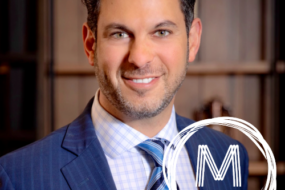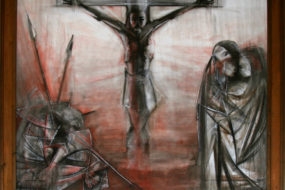December 12, 2023 • Life for Leaders
Scripture — Romans 8:22-25 (NRSV)
We know that the whole creation has been groaning in labor pains until now; and not only the creation, but we ourselves, who have the first fruits of the Spirit, groan inwardly while we wait for adoption, the redemption of our bodies. For in hope we were saved. Now hope that is seen is not hope. For who hopes for what is seen? But if we hope for what we do not see, we wait for it with patience.
Focus
Advent helps us to hope even when we’re groaning with pain and sadness in this broken world. When we focus on what God will do in the future, and when we remember the faithfulness of God, then we are helped to have hope even in hard times. Christian hope does not expect that everything in this life will turn out as we wish it would. But our hope is confidence in God and God’s future. The same God who once came among us as a baby born in a stable will come again in victory and glory. And we will share in his glory. This is central to our celebration of Advent.
Today’s devotion is part of the series Advent for the Children of God.
Devotion
Thirty-one years ago, I had a firsthand experience of groaning with hope during the season of Advent. Well, firsthand may be a bit of a stretch. It was more like first-and-a-half hand. I’m talking about the birth of my son, Nathan, who was born a few days before Christmas in 1992. The “groaning” to which I refer was that of my wife who spent many painful hours in labor before she finally gave birth. So, when Romans speaks of “groaning in labor pains,” that’s something I have observed up close. Obviously, I don’t know exactly how it feels, but I’m quite sure it’s extremely painful. I don’t even have to ask my wife about this.
The groaning associated with childbirth, however, is not like most of the crying that happens when we’re in great pain. Why not? Because it is accompanied by extraordinary hope. A woman giving birth and those at her side know that a new life is coming very soon. There’s shared excitement, indeed, buoyant hope. So, while the birth mother groans, she does so hopefully. Her child is almost in her arms.
Romans describes “the whole creation” as “groaning in labor pains until now” (8:22). This points to the pain and suffering that plagues a world corrupted by sin. Yet the created world is not alone in its lamentation. Romans continues, “And not only the creation, but we ourselves, who have the first fruits of the Spirit, groan inwardly while we wait for adoption, the redemption of our bodies” (8:23). We groan because we are part of the broken world in which suffering is pervasive. In particular, we groan because our bodies are unredeemed. We experience the impact of sin physically when birth is painful, when we are injured, when our bodies get older, when we are sick, and ultimately when we die.
Notice that Romans says that while we groan we are waiting for something in the future. Once again, we see that Romans 8 is filled with Advent themes. In this case, we are waiting “for adoption, the redemption of our bodies” (8:23). Now this might seem confusing. Waiting for adoption? Haven’t we already been adopted by God? Aren’t we already children of God? Yes, we have been adopted and yes, we are children of God right now. But in this age, we haven’t yet experienced the full joy and, indeed, glory of being God’s beloved children. These experiences will come in the age to come.
Moreover, we might wonder about the redemption of our bodies. Aren’t we waiting to leave our bodies behind so our spirits can go to heaven? Though Christians often use this language to describe our future with the Lord, Scripture affirms that our bodies will not be left behind when Christ comes again. Rather, they will be raised and transformed (see 1 Corinthians 15). As millions of Christians have confessed in worship services for centuries, we “look forward to the resurrection of the dead and the life of the world to come” (ending of the Nicene Creed).
As we wait for our full adoption, including the redemption of our bodies, we do so with hope, which is arguably the primary theme of Advent. In this season our hope is focused on the two “advents” of the Messiah. The first, the coming of Jesus, we celebrate at Christmas as something that happened in history two millennia ago. The second advent is still to come, when Jesus returns “with his angels in the glory of his Father” (Matthew 16:27). Romans 8 fills in many of the blanks associated with the second coming of Christ. It shows us that at this time God will reveal divine glory to the cosmos and share that glory with us. We will be restored by God’s grace to our glorious position of authority over creation. Creation will be set free from futility and decay as human beings faithfully steward what God has entrusted to us. In that time, suffering will be no more as we enjoy the fullness of life as God’s children and representative rulers of creation.
Groaning with hope is possible for children of God. But that doesn’t mean it’s easy to do. When you’re suffering personally, you may find hope elusive. And when we see so much pain and injustice in our world, hope for a better future can be hard to find. So how can we experience genuine, confident hope in Advent when life is hard?
There are no simple answers to this question. But Advent offers one answer among many options. When we focus on what God has done in the past and will do in the future, and when we remember the faithfulness of God, then we are helped to have hope even in hard times. Hope does not expect that everything in this life will turn out as we wish it would. But Christian hope is confidence in God and God’s future. The same God who once came among us as a baby born in a stable will come again in victory and glory, and even share that glory with us.
When it comes to finding hope in a broken and painful world, we are not alone. Not only has God given us the gift of sisters and brothers in Christ who can help us to experience hope, but also God has given us the gift of the Holy Spirit. As we’ll see in next Monday’s Life for Leaders devotion, the Spirit helps us when we feel weak and uncertain. Stay tuned. . . .
Reflect
Can you think of a time in your life when you were “groaning” in pain, sadness, or despair? (You may be in such a time right now.)
When you hear the word “hope,” how do you respond? What do you think? What do you feel?
How might hope in God’s future make a difference in your daily life?
Act
If you are in a time of groaning right now, find a place and time where you can pour out your heart to God. The Psalms model for us the freedom we have to “groan” before God in lament. Make use of this freedom. But if you’re not in a time of groaning now, think of someone you know who is, or some situation in the world, and offer your “groanings” to God in prayer.
Pray
Gracious God, you see and hear everything. You hear the “groaning” of creation. You hear the “groaning” of my heart.
Thank you for the freedom to pour out my heart to you, holding nothing back.
Thank you for the fact that when I am “groaning” I am not alone. How grateful I am for my sisters and brothers in Christ, my fellow “groaners.” And how grateful I am for your Spirit dwelling in me.
Amid my groaning, help me to have hope in you. Not wishful thinking or empty platitudes, but hope based on your faithfulness, your grace, your sovereignty. Amen.
Banner image by Grayom on Unsplash.
Find all Life for Leaders devotions here. Explore what the Bible has to say about work at the unique website of our partners, the Theology of Work Project’s online commentary. Reflection on today’s Life for Leaders theme can be found here: Our Work Is Not in Vain (1 Corinthians 15:58).
Subscribe to Life for Leaders
Sign up to receive a Life for Leaders devotional each day in your inbox. It’s free to subscribe and you can unsubscribe at any time.

Dr. Mark D. Roberts is a Senior Strategist for Fuller’s Max De Pree Center for Leadership, where he focuses on the spiritual development and thriving of leaders. He is the principal writer of the daily devotional, Life for Leaders, and the founder of the De Pree Center’s Flourishing in the Third Third of Life Initiative. Previously, Mark was the Executive Director of the De Pree Center, the lead pastor of a church in Southern California, and the Senior Director of Laity Lodge in Texas. He has written eight books, dozens of articles, and over 2,500 devotions that help people discover the difference God makes in their daily life and leadership. With a Ph.D. in New Testament from Harvard, Mark teaches at Fuller Seminary, most recently in his D.Min. cohort on “Faith, Work, Economics, and Vocation.” Mark is married to Linda, a marriage and family counselor, spiritual director, and executive coach. Their two grown children are educators on the high school and college level.




